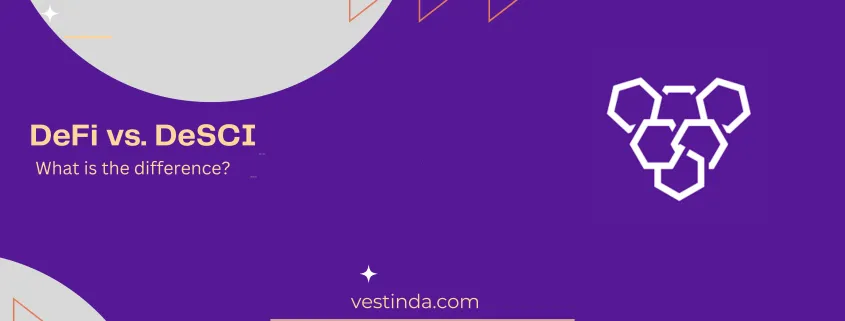Exploring the world of decentralized finance (DeFi) and decentralized science (DeSCI) coins? This article delves into the disparities between DeFi and DeSCI. With the rise of blockchain technology, both have emerged as significant players in the crypto sphere, albeit with distinct focuses. “DeFi vs. DeSCI: What is the difference?” sheds light on these differences, offering insights into their functionalities and purposes. From understanding their fundamental principles to exploring their respective pros and cons, this article aims to provide a comprehensive comparison to help readers make informed decisions in the ever-evolving landscape of decentralized finance and scientific research.
Article summary
What is DeFI?
DeFi, short for decentralized finance, revolutionizes the financial landscape through blockchain technology. It operates on decentralized networks, enabling peer-to-peer transactions without traditional intermediaries. In DeFi, users can access various financial services like lending, borrowing, and trading directly through decentralized applications (DApps) and smart contracts. This ecosystem offers transparency, security, and accessibility, empowering individuals globally to manage their finances autonomously.
Unlike traditional finance, DeFi eliminates barriers to entry, allowing anyone with an internet connection to participate in financial activities. Its decentralized nature reduces dependence on centralized institutions, fostering financial inclusion and innovation. As a result, DeFi is reshaping traditional finance, offering more efficient, transparent, and inclusive financial solutions.
What is DeSCI?
DeSCI, short for Decentralized Science, epitomizes the fusion of blockchain technology with scientific endeavors, paving the way for groundbreaking advancements. Unlike traditional scientific frameworks, DeSCI operates on decentralized networks, enabling transparent and collaborative research efforts. Through decentralized applications (DApps) and smart contracts, researchers worldwide can access and contribute to scientific data and findings securely.
DeSCI promotes transparency, immutability, and inclusivity in scientific research, fostering trust and collaboration among peers. By eliminating central authorities and intermediaries, DeSCI accelerates the pace of innovation while democratizing access to scientific knowledge. This decentralized approach revolutionizes scientific discovery, making it accessible to a broader audience and driving global progress in various fields of study.
Features of DeFi
- Non-Custodial: DeFi services ensure users retain control of their private keys and funds, minimizing counterparty risk and enhancing security. This decentralized approach eliminates the need for trust in third-party custodians.
- Yield Farming: Users can earn yields by providing liquidity to decentralized exchanges or participating in liquidity mining programs, incentivizing participation and liquidity provision in DeFi ecosystems. Yield farming involves staking or locking up cryptocurrencies in smart contracts to earn rewards.
- Permissionless Innovation: DeFi promotes permissionless innovation, enabling developers to create and deploy financial products without centralized approval, fostering creativity and diversity in the ecosystem. This open-source ethos encourages experimentation and drives rapid iteration in DeFi development.
- Security: DeFi protocols utilize cryptographic techniques and decentralized consensus mechanisms to safeguard user funds and prevent unauthorized access. By leveraging blockchain technology, DeFi platforms offer robust security features, reducing the risk of hacks.
- Programmability: DeFi protocols are programmable, enabling developers to create sophisticated financial applications and automate processes using smart contracts. These self-executing contracts facilitate trustless transactions and enforce predefined rules without the need for intermediaries.
- Transparency: Transactions on the blockchain are transparent and immutable, providing users with clear visibility into fund flows and protocol activities.
- Interoperability: DeFi protocols foster innovation through interoperability, allowing seamless interaction between different platforms and encouraging the development of new financial products.
- Accessibility: DeFi services are accessible to anyone with an internet connection and compatible wallet, promoting global financial inclusion. Unlike traditional finance, which may require extensive documentation and access to banking services, DeFi allows anyone to participate in financial activities using decentralized networks.
Features of DeSCI
- Decentralization: DeSCI operates on decentralized networks, leveraging blockchain technology to remove the need for intermediaries and facilitate direct interactions between users and scientific research protocols.
- Open Access: Anyone with an internet connection and compatible tools can access DeSCI platforms, promoting inclusivity and democratizing access to scientific research globally.
- Transparent Governance: DeSCI platforms often employ transparent governance mechanisms, allowing stakeholders to participate in decision-making processes and ensuring accountability and fairness.
- Immutable Records: Scientific data and research findings stored on the blockchain are immutable, providing a tamper-proof record of scientific discoveries and enhancing the integrity of research outcomes.
- Collaboration Incentives: DeSCI platforms incentivize collaboration among researchers by offering rewards for contributions to scientific knowledge and advancements, fostering a culture of knowledge sharing and collaboration.
- Smart Contracts: DeSCI protocols utilize smart contracts to automate processes and enforce predefined rules, streamlining research collaborations and facilitating trustless interactions between researchers.
- Interdisciplinary Integration: DeSCI promotes interdisciplinary integration by enabling researchers from diverse fields to collaborate on scientific projects, facilitating holistic approaches to complex scientific challenges.
- Peer Review Mechanisms: DeSCI platforms often incorporate peer review mechanisms to ensure the quality and validity of research findings, enhancing the credibility and reliability of scientific publications.
- Data Privacy: DeSCI platforms prioritize data privacy and security, implementing cryptographic techniques and decentralized storage solutions to protect sensitive research data and preserve confidentiality.
Pros of DeFi 👍
- Financial Inclusion: DeFi platforms offer financial services to anyone with an internet connection, irrespective of their geographic location or socioeconomic status, promoting financial inclusion on a global scale.
- Decentralization: DeFi operates on decentralized networks, eliminating the need for intermediaries and enabling peer-to-peer transactions, which enhances security and reduces dependence on centralized authorities.
- Transparency: Transactions on DeFi platforms are transparent and immutable, providing users with visibility into fund flows and protocol activity, which fosters trust and accountability within the ecosystem.
- Programmability: DeFi protocols are programmable, allowing developers to create customized financial applications and automate processes through smart contracts, which enhances efficiency and innovation in the industry.
- Yield Opportunities: DeFi offers various yield-generating opportunities, such as liquidity provision, yield farming, and staking, enabling users to earn passive income on their crypto assets, thereby incentivizing participation and liquidity provision in DeFi ecosystems.
- Innovation: DeFi encourages permissionless innovation, allowing developers to experiment with new financial products and services without requiring approval from centralized authorities, which fosters creativity and drives technological advancements in the industry.
Cons of DeFi 👎
- Security Risks: DeFi platforms are vulnerable to smart contract bugs, hacks, and exploits, leading to a potential loss of funds for users and damaging the reputation of the ecosystem. Auditing processes may not always catch vulnerabilities, exposing users to higher risks.
- Regulatory Uncertainty: DeFi operates in a regulatory grey area, and the lack of clear regulations can lead to legal challenges, regulatory scrutiny, and potential shutdowns of platforms, posing risks to users and investors. This uncertainty can also hinder institutional adoption and limit the growth of the ecosystem.
- User Experience Challenges: DeFi platforms often have complex user interfaces and require technical expertise to navigate, which can deter mainstream adoption and limit accessibility to non-technical users. Improvements in user experience are needed to attract a broader user base.
- Scalability Issues: DeFi protocols built on blockchains like Ethereum face scalability limitations, resulting in network congestion, high transaction fees, and slow transaction times during periods of high demand. Scaling solutions are being explored but are yet to be widely implemented.
- Market Volatility: DeFi markets are highly volatile, and users may experience significant price fluctuations, impermanent losses, and liquidation risks when participating in decentralized finance activities, which can lead to financial losses and instability in the ecosystem. Risk management strategies are essential for navigating these volatile markets effectively.
Pros of DeSCI 👍
- Transparency: DeSCI promotes transparency by leveraging blockchain technology, enabling transparent and immutable record-keeping of scientific data and research findings. This enhances reproducibility and trust in scientific outcomes.
- Collaboration: DeSCI facilitates collaboration among researchers by providing a decentralized platform for sharing data, resources, and expertise across borders and disciplines. This fosters innovation and accelerates scientific progress.
- Funding Accessibility: DeSCI offers decentralized funding mechanisms, allowing researchers to access funding directly from interested parties without relying on traditional intermediaries. This promotes inclusivity and provides opportunities for researchers from diverse backgrounds to participate in scientific endeavors.
- Democratization of Knowledge: DeSCI democratizes access to scientific knowledge by removing barriers to entry and enabling broader participation in research activities. This empowers individuals and communities to contribute to scientific advancement and address global challenges collaboratively.
- Security: DeSCI enhances security by leveraging cryptographic techniques and decentralized consensus mechanisms to protect research data and ensure the integrity of scientific processes. This mitigates risks associated with data manipulation, tampering, and censorship, enhancing trust in scientific research.
Cons of DeSCI 👎
- Scalability Challenges: DeSCI may face scalability challenges due to the complex nature of scientific research data and the large volumes of information generated. Scaling decentralized networks to accommodate increasing data demands and transaction throughput could be a significant hurdle.
- Regulatory Uncertainty: DeSCI operates in a regulatory grey area, with varying interpretations of existing regulations governing scientific research and data sharing. Uncertainty surrounding compliance requirements and potential regulatory changes may deter adoption and investment in DeSCI projects.
- Data Privacy Concerns: DeSCI raises concerns about data privacy and security, particularly regarding the protection of sensitive research data and personally identifiable information. Ensuring robust data encryption, access controls, and privacy-enhancing technologies is crucial to addressing these concerns.
- Network Vulnerabilities: DeSCI networks are susceptible to various security vulnerabilities, including smart contract bugs, protocol exploits, and 51% attacks. Mitigating these risks requires continuous monitoring, auditing, and implementation of security best practices.
- Adoption Barriers: DeSCI adoption may be hindered by technological barriers, lack of awareness, and resistance from established scientific institutions. Overcoming these barriers requires community education, collaboration with traditional research institutions, and ongoing development of user-friendly tools and interfaces.
What is the difference between DeFi and DeSCI?
DeFi focuses on decentralized financial services, enabling activities like lending, borrowing, and trading without intermediaries. In contrast, DeSCI, or decentralized science, centers on utilizing blockchain technology for scientific research, data sharing, and collaboration. While DeFi revolutionizes finance by eliminating traditional gatekeepers, DeSCI aims to transform scientific discovery and collaboration by providing transparent and immutable data-sharing platforms. Both DeFi and DeSCI leverage blockchain’s decentralized nature, but their applications differ significantly, with DeFi targeting financial services and DeSCI targeting scientific research and collaboration.

Ebiere Watchman is a prolific writer specialized in web 3.0 and finance. Ebiere’s experience includes research projects, sales copywriting, and storytelling. She prides herself in crafting impeccable content to drive mass adoption in cryptocurrency.


